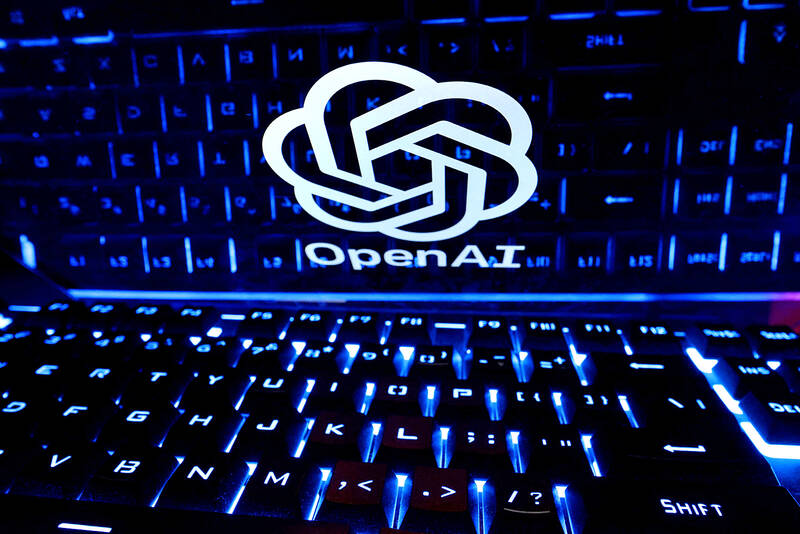OpenAI is working with Broadcom Inc to develop a new artificial intelligence (AI) chip specifically focused on running AI models after they have been trained, according to two sources familiar with the matter.
The AI start-up and chipmaker are also consulting with Taiwan Semiconductor Manufacturing Co (TSMC, 台積電), the world’s largest chip contract manufacturer, said the sources, who asked not to be identified because the discussions are private.
OpenAI has been planning a custom chip and working on such uses for the technology for about a year, but the discussions are still at an early stage, the sources said.

Photo: Reuters
OpenAI declined to comment. A representative for Broadcom did not respond to a request for comment, and a TSMC spokesperson said the company does not comment on rumors and speculation. Reuters reported on OpenAI’s ongoing talks with Broadcom and TSMC on Tuesday. The Information reported in June that Broadcom had discussed making an AI chip for OpenAI.
The process for taking a chip from design to production is long and expensive. OpenAI is less focused on graphics processing units, chips that are used to train and build generative AI models — a market that has been cornered by Nvidia Corp.
Instead, it is looking for a specialized chip that would run the software and respond to user requests, a process called inference. Investors and analysts expect the need for chips to support inference would only grow as more tech companies use AI models to field more complex tasks.
OpenAI might continue to research setting up its own network of foundries, or chip factories, one of the sources said, but the start-up has realized that working with partners on custom chips is a quicker, attainable path for now. Reuters earlier reported that OpenAI was pulling back from the effort of establishing its own chip manufacturing capacity.
Broadcom is the largest designer of application-specific integrated circuits — chips designed to fit a single purpose specified by the customer. The company’s biggest customer in this area is Alphabet Inc’s Google. Broadcom also works with Meta Platforms Inc and TikTok owner ByteDance Ltd (字節跳動).
When asked last month whether he has new customers for the business, given the huge demand for AI training, Broadcom chief executive officer Hock Tan (陳福陽) said that he would only add to his short list of customers when projects hit volume shipments.
“It’s not an easy product to deploy for any customer, and so we do not consider proof of concepts as production volume,” he said during an earnings conference call on Sept. 5.
OpenAI’s services require massive amounts of computing power to develop and run — with much of that coming from Nvidia chips. To meet the demand, the industry has been scrambling to find alternatives to Nvidia. That has included embracing processors from Advanced Micro Devices Inc and developing in-house versions.

Zhang Yazhou was sitting in the passenger seat of her Tesla Model 3 when she said she heard her father’s panicked voice: The brakes do not work. Approaching a red light, her father swerved around two cars before plowing into a sport utility vehicle and a sedan, and crashing into a large concrete barrier. Stunned, Zhang gazed at the deflating airbag in front of her. She could never have imagined what was to come: Tesla Inc sued her for defamation for complaining publicly about the vehicles brakes — and won. A Chinese court ordered Zhang to pay more than US$23,000 in

Taiwan Semiconductor Manufacturing Co (TSMC, 台積電) yesterday said that its investment plan in Arizona is going according to schedule, following a local media report claiming that the company is planning to break ground on its third wafer fab in the US in June. In a statement, TSMC said it does not comment on market speculation, but that its investments in Arizona are proceeding well. TSMC is investing more than US$65 billion in Arizona to build three advanced wafer fabs. The first one has started production using the 4-nanometer (nm) process, while the second one would start mass production using the

‘NO DISRUPTION’: A US trade association said that it was ready to work with the US administration to streamline the program’s requirements and achieve shared goals The White House is seeking to renegotiate US CHIPS and Science Act awards and has signaled delays to some upcoming semiconductor disbursements, two sources familiar with the matter told reporters. The people, along with a third source, said that the new US administration is reviewing the projects awarded under the 2022 law, meant to boost US domestic semiconductor output with US$39 billion in subsidies. Washington plans to renegotiate some of the deals after assessing and changing current requirements, the sources said. The extent of the possible changes and how they would affect agreements already finalized was not immediately clear. It was not known

A TAIWAN DEAL: TSMC is in early talks to fully operate Intel’s US semiconductor factories in a deal first raised by Trump officials, but Intel’s interest is uncertain Broadcom Inc has had informal talks with its advisers about making a bid for Intel Corp’s chip-design and marketing business, the Wall Street Journal reported, citing people familiar with the matter. Nothing has been submitted to Intel and Broadcom could decide not to pursue a deal, according to the Journal. Bloomberg News earlier reported that Taiwan Semiconductor Manufacturing Co (TSMC, 台積電) is in early talks for a controlling stake in Intel’s factories at the request of officials at US President Donald Trump’s administration, as the president looks to boost US manufacturing and maintain the country’s leadership in critical technologies. Trump officials raised the